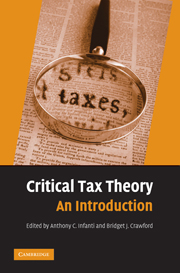Book contents
- Frontmatter
- Contents
- List of Illustrations
- List of Tables
- List of Contributors
- List of Common Abbreviations
- Introduction
- CHAPTER 1 FOUNDATIONS OF CRITICAL TAX THEORY
- CHAPTER 2 HISTORICAL PERSPECTIVES ON TAXATION
- CHAPTER 3 THE GOALS OF TAX POLICY
- Racial Equality in the Twenty-First Century: What's Tax Policy Got to Do with It?
- Discursive Deficits: A Feminist Perspective on the Power of Technical Knowledge in Fiscal Law and Policy
- The Hidden Costs of the Progressivity Debate
- Tax Equity
- Tax Policy and Feminism: Competing Goals and Institutional Choices
- CHAPTER 4 CRITICAL TAX THEORY MEETS PRACTICE
- CHAPTER 5 RACE AND TAXATION
- CHAPTER 6 GENDER AND TAXATION
- CHAPTER 7 SEXUAL ORIENTATION AND TAXATION
- CHAPTER 8 THE FAMILY AND TAXATION
- CHAPTER 9 CLASS AND TAXATION
- CHAPTER 10 DISABILITY AND TAXATION
- CHAPTER 11 GLOBAL CRITICAL PERSPECTIVES ON TAXATION
- CHAPTER 12 CRITICAL PERSPECTIVES ON CRITICAL TAX THEORY
- Index
Discursive Deficits: A Feminist Perspective on the Power of Technical Knowledge in Fiscal Law and Policy
Published online by Cambridge University Press: 04 August 2010
- Frontmatter
- Contents
- List of Illustrations
- List of Tables
- List of Contributors
- List of Common Abbreviations
- Introduction
- CHAPTER 1 FOUNDATIONS OF CRITICAL TAX THEORY
- CHAPTER 2 HISTORICAL PERSPECTIVES ON TAXATION
- CHAPTER 3 THE GOALS OF TAX POLICY
- Racial Equality in the Twenty-First Century: What's Tax Policy Got to Do with It?
- Discursive Deficits: A Feminist Perspective on the Power of Technical Knowledge in Fiscal Law and Policy
- The Hidden Costs of the Progressivity Debate
- Tax Equity
- Tax Policy and Feminism: Competing Goals and Institutional Choices
- CHAPTER 4 CRITICAL TAX THEORY MEETS PRACTICE
- CHAPTER 5 RACE AND TAXATION
- CHAPTER 6 GENDER AND TAXATION
- CHAPTER 7 SEXUAL ORIENTATION AND TAXATION
- CHAPTER 8 THE FAMILY AND TAXATION
- CHAPTER 9 CLASS AND TAXATION
- CHAPTER 10 DISABILITY AND TAXATION
- CHAPTER 11 GLOBAL CRITICAL PERSPECTIVES ON TAXATION
- CHAPTER 12 CRITICAL PERSPECTIVES ON CRITICAL TAX THEORY
- Index
Summary
No great powers of observation are needed to notice that both tax law and fiscal policy formation are dominated by a relatively small and elite group of experts. Nor would many dispute the inaccessibility of the technical language in which these issues are often discussed. In this paper, I focus on the way these technical discourses tend to deny the normative content of tax law and policy, and thus to deflect political challenges to the prevailing fiscal order. In this manner, technical discourses work to protect the interests of the relatively wealthy and powerful, and to sustain and legitimate the economic marginalization of women and other subordinated groups.
THE TECHNICAL IN TAX LAW
What is a technical discourse? The term has several layers of meaning, as it is used in this paper. Tax law is technical in the dictionary sense that it is a specialized field of knowledge, with its own language, involving a terminology and grammatical style that is not readily accessible to persons without specialized training. This inaccessibility is not merely a function of complexity or excessive detail. Indeed, bits of jargon and special terms can be used to bestow authority on even the most superficial or oversimplified analyses.
In addition, tax law is affiliated with certain other discourses that are technical in the same sense of being specialized fields of knowledge: economics, accounting, public finance theory, traditional tax policy analysis. Aspects of these discourses have been imported into, and internalized within[,] tax law, though judges in tax cases are quick to assert that such external knowledges always remain subject to any overriding legal principles.
- Type
- Chapter
- Information
- Critical Tax TheoryAn Introduction, pp. 46 - 52Publisher: Cambridge University PressPrint publication year: 2009



